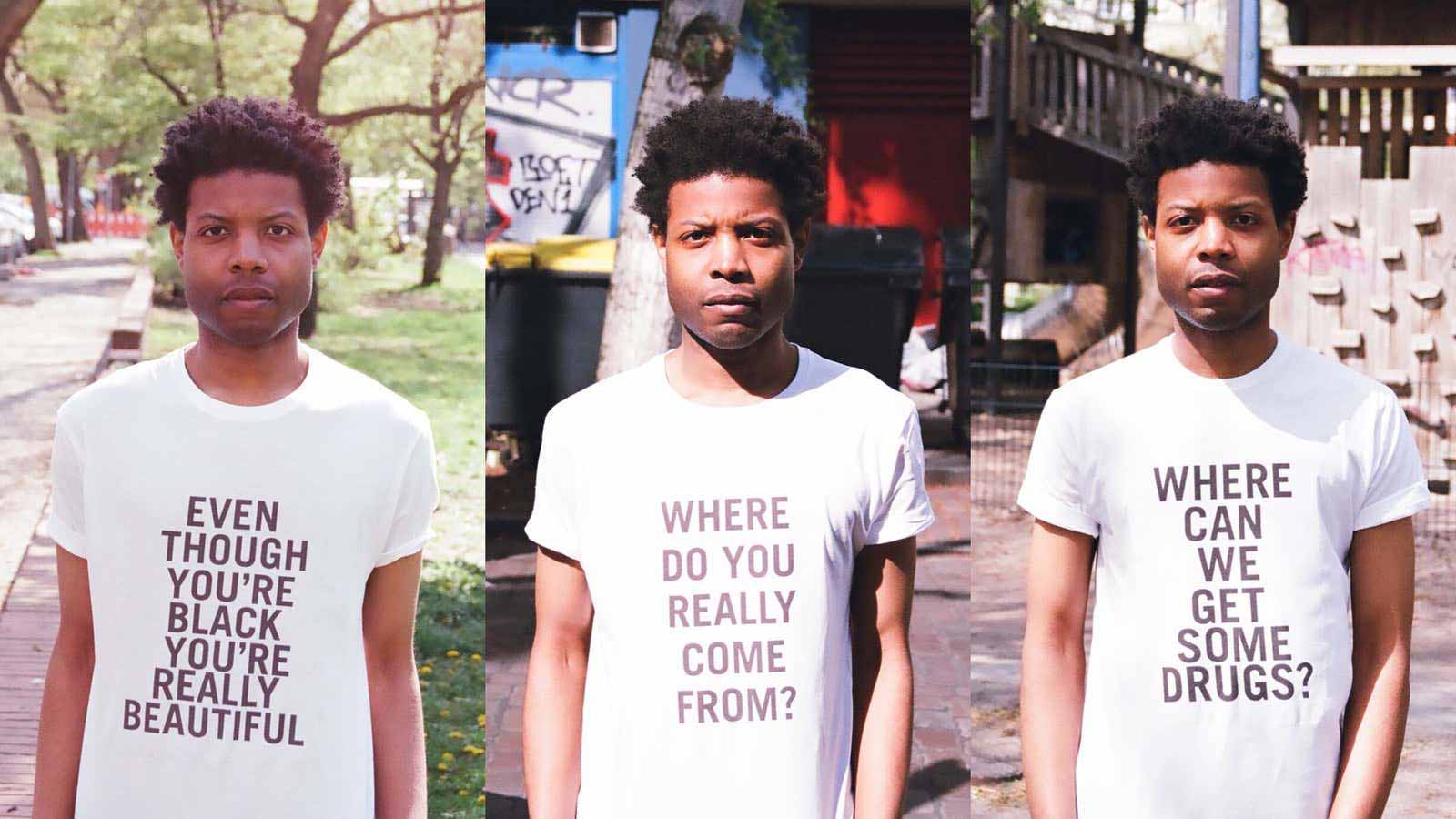A black American artist is printing t-shirts with the racist comments he has heard in Berlin.

There are important differences in the way black people are racialized in the US and in Germany. When Lopaz first moved to Berlin 2007, he says: “I remember noticing there weren’t many black people in the street,” Lopaz says. “And that I was very much being made a spectacle of; people were looking at me, staring at me on the streets.” While the number of black people and people of color has increased over the last decade in Germany, they still remain an invisible minority.
Racial categories that are commonplace in the US and UK—such as white, black, and Asian—simply aren’t discussed in Germany. The government doesn’t measure the number of ethnic minorities in certain schools, universities, and jobs. The reasoning behind this is simple: Everyone is German, the thinking goes, and should be treated the same across the board. This approach might sound egalitarian, but it has meant there is little discussion of the deep-seated discrimination plaguing communities of color in education, housing, and employment, critics have warned.
One million refugees entered Germany at the peak of Europe’s refugee crisis in 2015. The inflow sparked a heated national debate on race and identity. In the run-up to last year’s election, Germany’s interior minister released a 10-point proposal for defining national identity, asserting among other things that “we don’t do burqa.” The far right’s campaign posters boasted headlines like: “Burqas? We like bikinis,” and “New Germans? We can make them ourselves.”
The refugee crisis gave a boost to the anti-immigrant party, Alternative for Deutschland (AFD)—and last year, German voters put a far-right party into parliament for the first time since the Second World War in the September election. While the focus has largely been on the things the AFD say about migrants, leading politicians in the party have also been accused of espousing anti-black racism too. AFD MP Jens Maier, who was elected last year, attacked Noah Becker (son of the German tennis star Boris Becker) over an interview in he said he was tired of being seen as the “eternal son” of his famous father. Maier went on to tweet: “It seems the little half-negro simply got too little attention—that’s the only explanation for his behavior.” (The tweet has since been deleted). Noah Becker, whose mother is of African-American descent, pressed charges against Maier for the tweet earlier this month.
Lopaz says he is sometimes asked which country is better for black people, Germany or the US. It’s a hard question to answer, he said. There’s the rise of visible racist rhetoric in Germany, but in the US, the threat of police brutality and other racial violence cannot be denied.
The last decade has seen a growth in black activism in Germany. “There are more international black communities that are linking up,” Lopaz says. “We are trying to speak up about racism and we’re also trying to create projects that foster community and spaces for conversations, transformations, and healing.”
https://www.nytimes.com/2016/11/17/learning/confronting-stereotypes.html
https://www.nytimes.com/2016/11/17/world/europe/berlin-racism-isaiah-lopaz.html
https://sites.google.com/site/uncertaintysayings/
https://www.dw.com/pt-br/checkpoint-berlim-arte-para-combater-o-racismo/a-39170341
https://www.deutschlandfunkkultur.de/kunst-gegen-alltagsrassismus-provokante-shirts-gegen-100.html
https://kurier.at/style/warum-diese-t-shirts-rassistische-sprueche-tragen/233.087.678
http://janettesnakehole.soup.io/post/615310673/black-love-unity
https://www.deutschlandfunknova.de/beitrag/isaiah-lopaz-du-bist-doch-schwarz